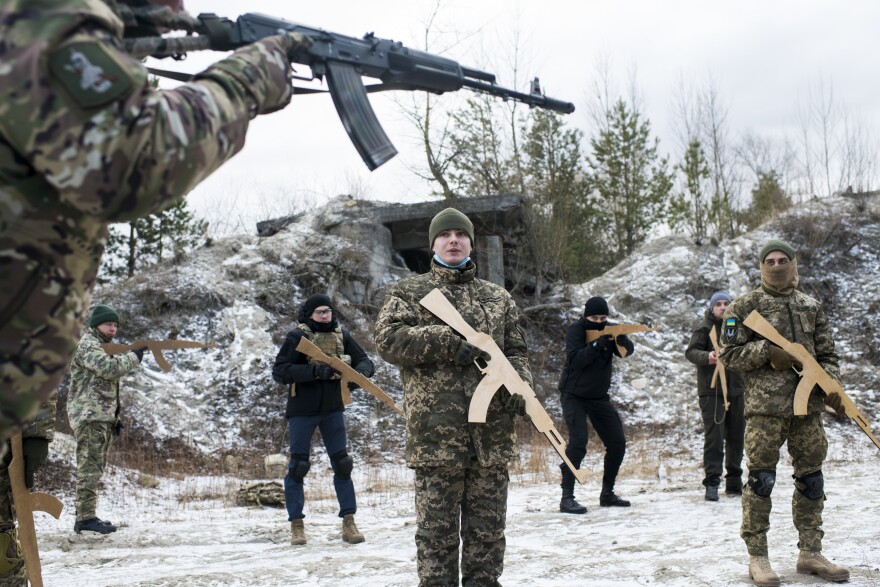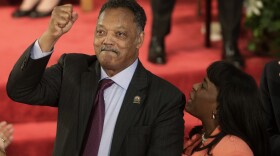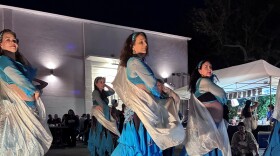KYIV, Ukraine — In cities across Ukraine, there are billboards that show a smiling young man beckoning in full battle gear. "Learn how to defend your home today," the message says.
The advertisement from Ukraine's Territorial Defense Forces, an offshoot of the army, seems to be working. As Ukrainians prepare for a possible Russian invasion, thousands of citizens are volunteering to train in case they have to help protect their cities.
On the edge of a forest outside Kyiv, about 60 men and women line up to begin six hours of military tactical training on a frigid Saturday morning.
Civilian clothes are left inside cars parked along the dirt road. Dressed in battle fatigues and cradling guns and wooden replicas, this group is ready for action.
"I decided for me, it's time to be prepared," says Yegor Soboliev, a former member of Ukraine's parliament. Soboliev says he signed up after Russian President Vladimir Putin began to move troops to Ukraine's border.

"This is a good way of being trained for people who have jobs, families and for older people," he says with a chuckle. "I think this will change the situation with our security dramatically."
Soboliev says Ukraine, like Israel, should be prepared for war at any minute to protect its independence.
Ordinary Ukrainians began training last year to prepare for a Russian invasion
The Territorial Defense Forces were set up to train part-time reservists after 2014, when Russia seized and annexed Crimea.
But last year, the drills were opened to ordinary citizens as part of the country's strategic defense plan in the event of a potential invasion by Russia — to foster popular resistance if the Ukrainian military is overwhelmed. They're learning guerrilla tactics and firearm basics.

Eastern Ukraine is already embroiled in a separatist war fueled by Russia. Civilians at this training guess there's a 50-50 chance Russian troops will now invade. The deputy chief of the battalion, 50-year-old Vlas Honcharuk, says Ukrainians must be able to defend their cities block by block.
"I feel a little bit tired, but pumped up," he says. "I'm here because I'm Ukrainian and there's a war going on. Because Putin actually is the Hitler of 21st century. History repeats."
The trainees are learning how to shoot and crawl in the forest. The littered shell of a partially constructed cement factory provides a setting to practice urban guerrilla tactics.

Many of the volunteers are old enough to remember when Russians and Ukrainians were Soviet brothers. They say Ukrainians did not have such a strong separate identity following its independence from the Soviet Union in 1991. But now, thanks to Putin's military aggression and propaganda, says Honcharuk, a true Ukrainian nation is being forged.
"Why did they start this war? Because they don't even consider Ukraine as a proper nation," he says. "They think of Ukrainians and Belarusians as Russian, but a kind of second-class Russian, what we call a village Russian. And that's why they're always saying, 'Aw, come off it, cut it out with this independence stuff.'" Honcharuk calls the Russian attitude "offensive."
Nearly half a million Ukrainian civilians are already involved in their country's defense effort in the east
Civilian defense is not an unknown concept in Ukraine. In 2014, when the war against Russian-backed separatists began in the east, volunteer brigades made up a large part of the country's forces.

Retired Ukrainian Gen. Volodymyr Havrylov says the situation now is totally different. He says the Ukrainian army, with more than 200,000 active-duty personnel, is well trained and prepared, and most importantly, highly motivated and fighting to defend its own territory. And not just the army, he says — ordinary citizens, too.
"Our troops, our military and civil society are all highly motivated compared with what it was in 2014," he says. "Today we have more than 400,000 citizens participating in all kinds of activities to help with the war effort in the east. This is a very critical mass of people which was absent in 2014."
Oleksiy Vasylchenko, a 55-year-old digital marketer and part-time diving instructor, was in the Soviet army 35 years ago. He says when Russia took Crimea from Ukraine in 2014 and stirred up the fighting in the east, Putin poisoned relations between Ukrainians and Russians, many of whom maintained close personal ties after the Soviet collapse.
"A lot of my friends, my relatives, called me and say that we are fascists here, we kill everybody," he says. "Because Russian propaganda all time says that [Ukraine is] nationalist, it's fascist and [Ukrainians] ... kill people [who] speak in Russian language."
Utter fabrication, says Vasylchenko, noting that Russian is commonly spoken in Ukraine. But now, he says, because of Putin's aggressive tactics, people are switching to Ukrainian.
Many Ukrainians tell NPR they now feel closer to Europe than in the past and their values are in line with European values. That bond is being strengthened as Ukrainians travel more frequently to Europe. In 2017, the European Union waived visas for Ukrainians.

Marta Yuzkiv, a doctor who works in medical trials when she's not volunteering for military training, says Ukrainians feel they're fighting for something bigger.
"I would like to say that we are in danger now, and not just danger for Ukraine, but danger for the whole democratic world," she says. "So I hope all together we can stop Putin. And I know that all Ukrainian partners are supporting us in this effort, so we are grateful for this."
Ukraine is receiving military help from NATO, Europe and the U.S. On Wednesday, the Biden administration announced an additional $200 million in defensive military aid. If Putin invades, Secretary of State Antony Blinken said, that support will increase.
Copyright 2023 NPR. To see more, visit https://www.npr.org.






